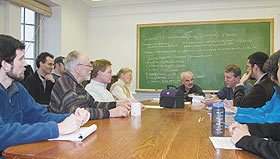  |
| HOME | THIS ISSUE | CALENDAR | GRANTS | BACK ISSUES | < BACK | NEXT > |
Brown bag luncheons promote philosophical discussionsby Jessica Duch - December 12, 2005 |
||||
|
Every Wednesday at noon, philosophy professors and students open their brown bag lunches and begin a discussion that may range from the value of truth to the role of common sense. With participants crowded around a conference table, the event is an unusual blend of lofty conversation and a cafeteria-like atmosphere. “What much of philosophy is about is noticing inconsistencies in common sense,” says Crawford Elder, professor and head of the philosophy department. “This can either make you want to cry or want to laugh.” The hour-long “brown bag” luncheons are open to anyone. The participants are predominantly faculty or graduate students, but one or two undergraduates find their way to the lunches. Each week, the small room in Manchester Hall is so full that some need to pull up chairs in the hallway by the door. “Other philosophy departments don’t do this,” says Elder. “People who have visited here find it quite remarkable.” After an opening presentation, the floor is open for questions and comments. Graduate students hold precedence over faculty during the question-and-answer session; their ideas are considered first. “Philosophy is a discipline where one of the principal means of research is conversation and discussion with other philosophers,” says Patrick Fleming, a Ph.D. student. The luncheons were begun by Professor Joel Kupperman nearly 40 years ago, for faculty members and students who had work in progress to bring it to the table for input and development. “The idea of the brown bag seminar series was that both faculty members and graduate students might have work in progress – or simply ideas that could be developed – that would benefit from comment at an early stage,” Kupperman says. Adds Brian Leahy, a Ph.D. student, “You’re already committed to your argument, so it’s good to get someone else’s perspective.” Some weeks no one would have time to prepare a discussion, so workshops would be given to graduate students as a substitute. Today, the luncheons are still a forum for members of the department to swap research information. As the participants eat lunch, they examine different aspects of the world and humanity. A sign-up sheet is posted beside the department office, but no one needs to look to make sure there will be a meeting that week. “Currently, the event runs itself,” says Kupperman.
With weekly meetings, the faculty have current knowledge of their colleagues’ work. Instead of focusing only on their own areas of specialization, professors get to examine other areas of philosophy being explored by their contemporaries. Because of the weekly luncheons, says Kupperman, “we mostly do know what our colleagues are up to, and have a better sense of why it might be important.” Part of the reason the seminars are unusual is the way the department accepts new ideas and constructively gives criticism. “While questions or comments can be quite telling, they are never belittling,” Kupperman says. “Presenters – including graduate students, who may be offering a first version of what will be a central idea in their dissertations – should feel relaxed about opening themselves up to criticism. Luckily ours is a ‘nice’ department. If there were even one person who liked cutting people off at the knees, the series would not work.” The brown bag series helps students hone skills that are central to a philosopher’s work. “It integrates graduate students,” says Kupperman, “helping the transition from good student to professional philosopher that is crucial to the graduate experience.” Students agree the seminars allow them to throw out ideas without judgment. “They won’t think less of you at the end,” says Leahy, “they might actually think more of you for having gotten up, standing in front of the group and doing your best.” While philosophy is often dismissed as an abstract and outdated practice, its value in society is evident in the skills it instills in those who study it, say philosophy faculty. Fields such as business, law, healthcare, and education benefit from clear-thinking professionals who form ideas logically and can articulate them for any audience. According to a 1964-1982 study by the National Institute of Education, philosophy majors scored significantly higher on the Law School Admissions Test than students in any other undergraduate major except mathematics. “Logic is a method of inquiry that tells you when the reasons someone is giving you to buy into something are good,” Elder says. “Just about anyone needs to be good at logic.” Jessica Duch is an undergraduate student. |
| ADVANCE HOME UCONN HOME |

